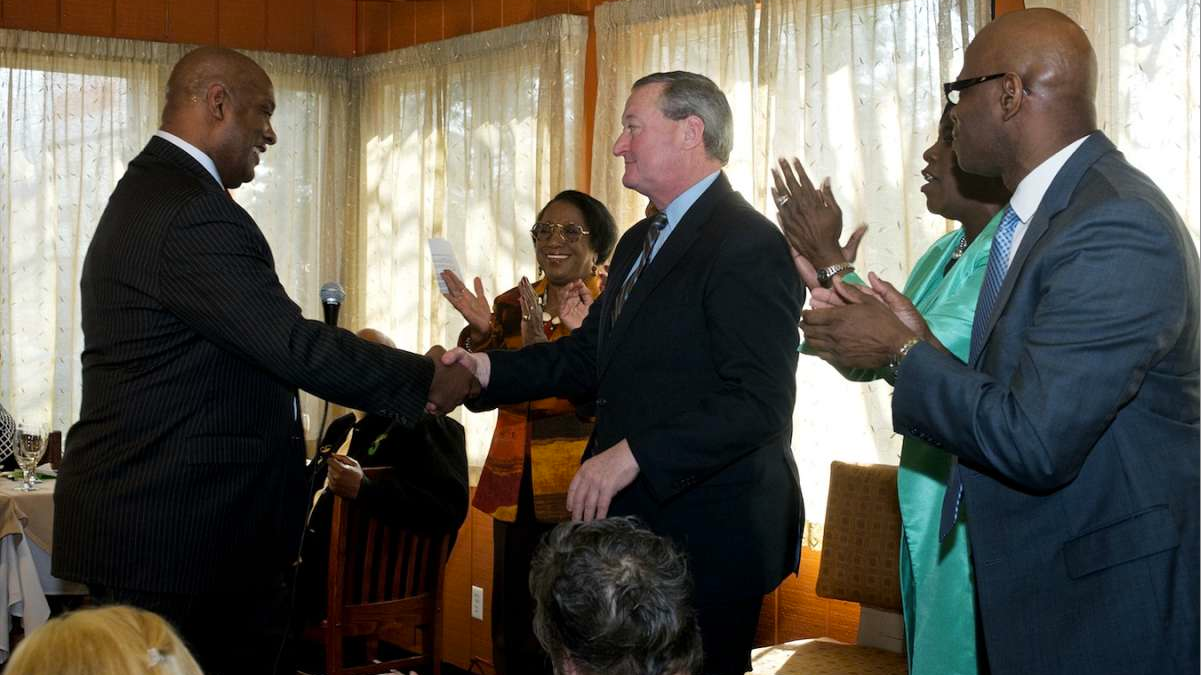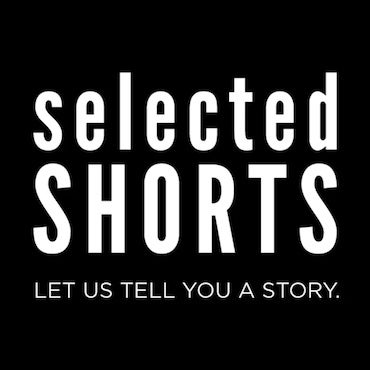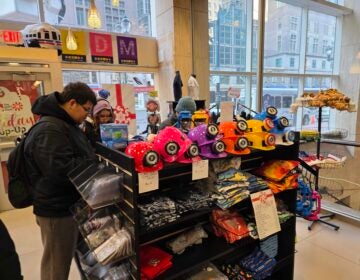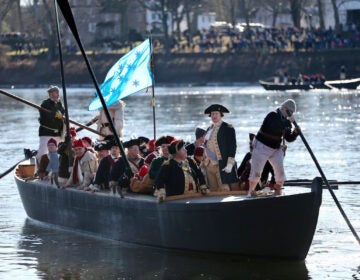Q&A: Dwight Evans on endorsing Jim Kenney and the race-tinged aftermath

State Rep. Dwight Evans, who ran for mayor eight years ago, shakes Jim Kenney's hand at the April 6 endorsement event in West Oak Lane. (Bastiaan Slabbers/for NewsWorks)
Just two weeks ago, state Rep. Dwight Evans led a group elected officials who formally endorsed former city councilman Jim Kenney’s mayoral candidacy during a lively event at West Oak Lane’s Relish restaurant.
Suffice it to say, it sparked an interesting 14 days in the campaign.
The aftermath started with stories about the historical importance of African American elected officials endorsing a white candidate.
It continued on to last week’s counter-endorsement event at which one speaker (see video at bottom of the post) questioned the wisdom of those who went against mayoral candidate Anthony Williams.
That, in turn, sparked whispers of Williams’ late father Hardy becoming “the first black elected official in the city to endorse former District Attorney Edward G. Rendell in the Democratic race for mayor” in 1991.
On Monday, Evans sat down with NinetyNine for breakfast at the Trolley Car Diner in Mt. Airy to discuss the rationale for endorsing Kenney and weigh in on the reaction to state Reps. Stephen Kinsey and Cherelle Parker and City Councilwomen Cindy Bass and Marian Tasco doing so.
What follows is a lightly edited version of a conversation which started after Evans shared the Northwest Leadership Collaborative’s “Invest Northwest Strategy” near a map comparing Northwest Philadelphia high schools’ low Pennsylvania School Performance Profile scores to a markedly higher Cheltenham High School.
Q&A
99: Let’s talk about how this endorsement came to be.
Dwight Evans: You may have seen this [Invest Northwest Strategy] before. We had the first town meeting right here [at the Trolley Car Diner] and we talked about the strategies about the Northwest. This is what we presented to Jim Kenney.
If you look at his economic plan, he mentions the Northwest specifically. He borrows some of the concepts of tax policies from here. That’s part of our agenda, of what we want to do. Clearly, we thought he best understood that all neighborhoods matter.
In our thinking, that’s what’s important to us. It’s our agenda that we presented. We met with them all except Milton Street.
We had a forum at West Oak Lane Charter School. Marian Tasco met with Tony Williams. I met with Tony Williams. Cherelle met with Tony Williams. Cindy and Steve met with Tony Williams. We met with Jim Kenney a couple times. We met with Doug Oliver. What we said to ourselves as we talked about it was that we’d let the process take place, meaning the campaign, and on April 6, we concluded that we thought Jim Kenney would be the best candidate to help us implement our agenda.
Those who are trying to accuse us of making it personal, it’s not like we don’t know all of the candidates. Nelson [Diaz] lives in the Ninth Ward. Doug Oliver lives in East Oak Lane. Obviously, we know Tony Williams. We know ’em all.
What we tried to do is look at each of them and decide who could best move the city forward and we felt that with Jim Kenney’s 23 years on City Council — as well as the things he’s done by being against stop and frisk, stand your ground, minority participation — of all the candidates, he was the best one to move the city forward with a coalition.
99: Did that message not come across when the endorsement was announced? It went right to race.
DE: Correct. But there’s not much we can do about that. Everybody stated why they thought Jim Kenney was the one. Marian Tasco was there for 23 years working with him. She saw him up close. Cindy was there for four years. Cherelle, Steve and I could only do it through the process of meeting with each of the candidates. So, it’s not like people didn’t compete for our support. We met with them and then made the decision.
We laid out a message and laid out the why, at this moment, he would be the best candidate for the Democratic nominee. We talked about partnerships, about making this city work. We have over 75 years of experience combined, so we’re not talking about people who don’t have a clue here.
99: Why not Tony?
DE: I don’t think it’s a question about why not as much as it was a question of what we thought Jim had moreso than not being anti-…
When I listen to [Kenney] and hear what he says, it’s kind of a ‘back to basics’ philosophy about city governance. … He has huge relationships with the ports. He talks about neighborhoods like Passyunk which is similar to what we have on Ogontz Avenue. Then, he talks about schools as being at the center of community development. He’s dealt with everybody, and council at-large is all over the city, so he’s been all over for 23 years.
So, the question became why not consider him? Should we allow what others have tried to say about why he should not be considered? He should be considered like everyone else, and that’s what we did: We listened.
Everybody wanted to be assured that Jim understood the importance of the agenda in the Northwest. There were three very intense meetings with him about the importance of the agenda and the importance of he and [having support from] John Dougherty. We stood up against Local 98 [and protesting the Trolley Car] and we said to him that’s not an acceptable form of behavior. We didn’t take that out of the [strategy document]. We can’t have our businesses being harrassed. We’re not anti-union, but there are other ways to handle that. …
We feel [Kenney] is more in sync with a pro-growth, pro-development strategy. That’s not anti-Tony Williams. That’s not anti-Nelson Diaz. You can only be for one candidate. I don’t think you’ve heard any of the supporters by anti-anybody. You make a choice.
99: So, what do you make of the reaction to the endorsement?
DE: Look, people have a right to be for who they want to be for. That’s the way I look at it. I don’t want people to get those kind of comments mixed up with why we made this decision. I can’t stop people from feeling what they feel and thinking what they think.
I’ve been on all sides of this. I was for [vocal endorsement critic] George Burrell [when he ran for mayor] against Ed Rendell in 1991.
They have a right. We have a right. And, ultimately, the voters are going to decide. I can’t stop them from saying what they say. I think that, what it really boils down to is, we have to continue to find ways to move the city forward.
99: What do you think about the old-school vs. new-school feel of the groups involved in the endorsement/counter-endorsement dynamic?
DE: Do you want to talk about the future or the past? I always prefer to talk about the future and I can’t do anything about what they’re saying. I don’t feed into that because I think there’s too much of that; there’s too much negavitity instead of moving ahead. I don’t want you to think I got rose-colored glasses about this issue of power and control. I’m very realistic about the fact that we must work with all people no matter where they are.
I was out there with Tom Wolf [during his campaign for governor]. Marian and Cherelle weren’t where I was at. I was out there for [newly minted state Sen.] Art Haywood [against LeAnna Washington] and nobody was out there with me on that either. But I believed these people could be part of a team that moved Northwest Philly forward.
You ask about old and new, I think that speaks for itself. I think it’s about the future, 21st Century, engaging all sorts of people. You will only do that with inclusion.
99: Why do you think people are focusing on this other stuff then?
DE: What’s so destructive about it is that it loses the focus on the race. I hate to say it, but this stuff gets more headlines. Think about it: That was two weeks ago. You’re not going to solve race in a campaign. Remember that Barack Obama race speech at the Constitution Center when he ran in ’07? The issue of race, you’re not going to address it in a campaign. I’m not saying it doesn’t exist. But you can’t address it in 30-second soundbites. You’re not going to solve it. But that’s part of why we’re talking here today, let’s be honest.
99: Have you talked to Tony?
DE: Not since we met with him before we made our decision.
99: Is there any sort of lingering beef there?
DE: That’s exactly what they’re doing. “Dave Richardson turned over in his grave.” “Bill Gray turned over in his grave.” “It’s a mistake.” “We’re not going to be at the table.” I mean, c’mon. You go through each of the words and it’s easy to figure out what’s being said.
99: Does that sting you personally?
DE: No.
99: Why not? Just used to it?
DE: It’s unfortunate, but it doesn’t sting me personally. If anything, it probably disappoints me that all these people are over 60 years of age. You’re not talking about kids, and we’re not talking about the 1960s or the 1970s. You’re talking about what best works for these communities today.
You didn’t hear any of this [Northwest agenda and school scores] talked about at that press conference, but this is what people are most concerned about. Jobs and this. I can’t help it if others move the conversation in directions other than this, which is what’s happened in the last two weeks.
99: Was their reaction expected?
DE: Not from my perspective. I can’t believe that these individuals have made this such a focus. Not about education. Not about jobs. But this? It’d be different if we didn’t talk to all the candidates, but we did. … All they talk about is strategy. We’re talking about a vision for the future of this city.
You don’t hear them attacking us on the issues. They’re going to the part where they think it registers with people.
99: If only in a limited sense, it probably does.
DE: It will register with some.
99: The reaction has been positioned as you claiming to speak for everyone in the Northwest.
DE: If you go back to that press conference, you won’t hear one person claiming that we speak for everyone with our endorsement. This is what we did: We’re all elected in different areas. We have a right to express our opinions, and that’s what we did. I did that with Wolf. I did that with Art Haywood.
Did anybody say anything then? What’s all this about, for two weeks?
I’m not trying to play cavalier with you. The message I’m trying to get across is this: We have a vision, and we’re saying to the voters of the Northwest and others with like minds, that we have a plan and an agenda which we have spoken with Kenney about. He has embraced what we’re talking about, and that’s what we want to move forward on. We would hope that people, on May 19, will vote for him. That’s what we hope.
99: What happens, for Northwest Philly, if Tony wins? Is there a fear he’ll hold a grudge?
DE: I can’t answer that question if he will or will not, but I can say that I have strong feelings that Jim Kenney will be the nominee. Not just because of the Northwest, but Northeast, South Philly, the LGBT community, the unions, NOW chose him [over Lynne Abraham]. At the end of the day, the man has gotten broad-based support all across the city. It’s not one section, and if you’re going to move the city forward, that’s what you need to have.
I’m more pro- my guy. I see my guy being there, being focused. He’s been doing the right things, raising money, getting endorsements, support all around the city. Even when you go among the ward leaders. He has a majority of the ward leaders. From what I hear, there’s 69 ward leaders, he has about 50 of them. This is the first time I’ve seen AFSCME all behind the same candidate, too. …
Look at that coalition: There’s the labor people talking to their constituents and there’s the political people talking to their constituents. That’s why when you asked me this question about Tony, I think that Jim is in an excellent position to win.
Now, you’ve got these other people [independent expenditure groups] spending all of this money. Well, Tom Knox spent more money than anybody [in the 2007 mayoral primary]. Marty Weinberg spent more than anybody [in the 1999 mayoral primary].
Money is a factor, but it’s not the determining factor. Tom Knox should be mayor of the City of Philadelphia. You had three African Americans in the race: Chaka Fattah, Michael Nutter and myself, and Brady and Knox. And, who wins? Michael Nutter who got 25 percent of the white vote.
In 1999, I ran, John White ran and John Street ran. Marty Weinberg had more money than us and he came in second.
What I’m saying is that the sophistication of the voters, do not underestimate them in their thinking. Don’t play silly games with them.
99: I just wonder whether many voters are paying attention yet and then, when they check in, it’s going to be ugly-ad time.
DE: Well, that may be true but I would hope that Kenney keeps rising above it. There are two debates coming up. Jim is in an excellent position.
I don’t dislike any of the candidates, but I can only be for one of ’em.
WHYY is your source for fact-based, in-depth journalism and information. As a nonprofit organization, we rely on financial support from readers like you. Please give today.




